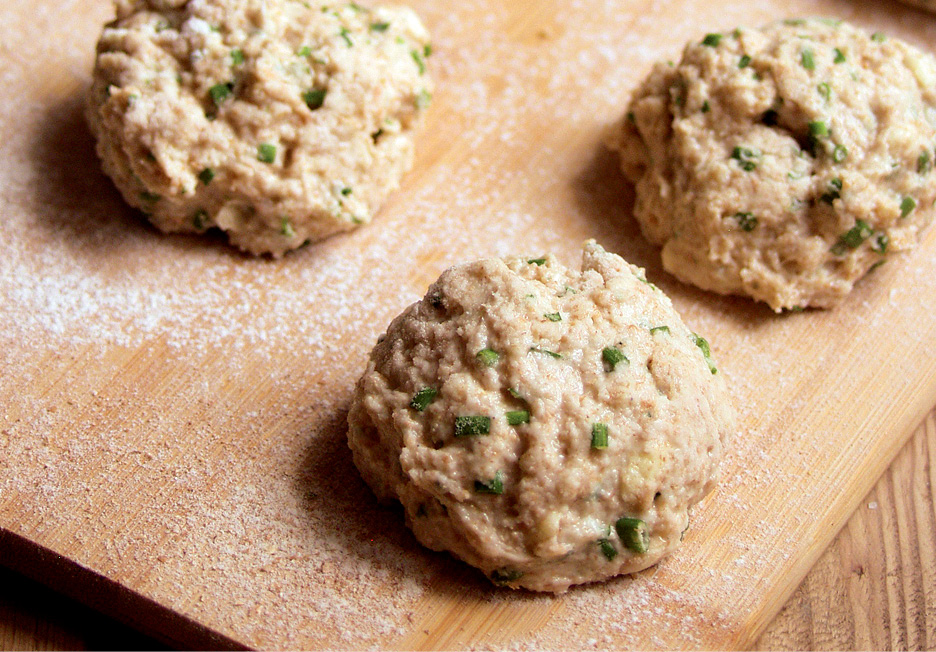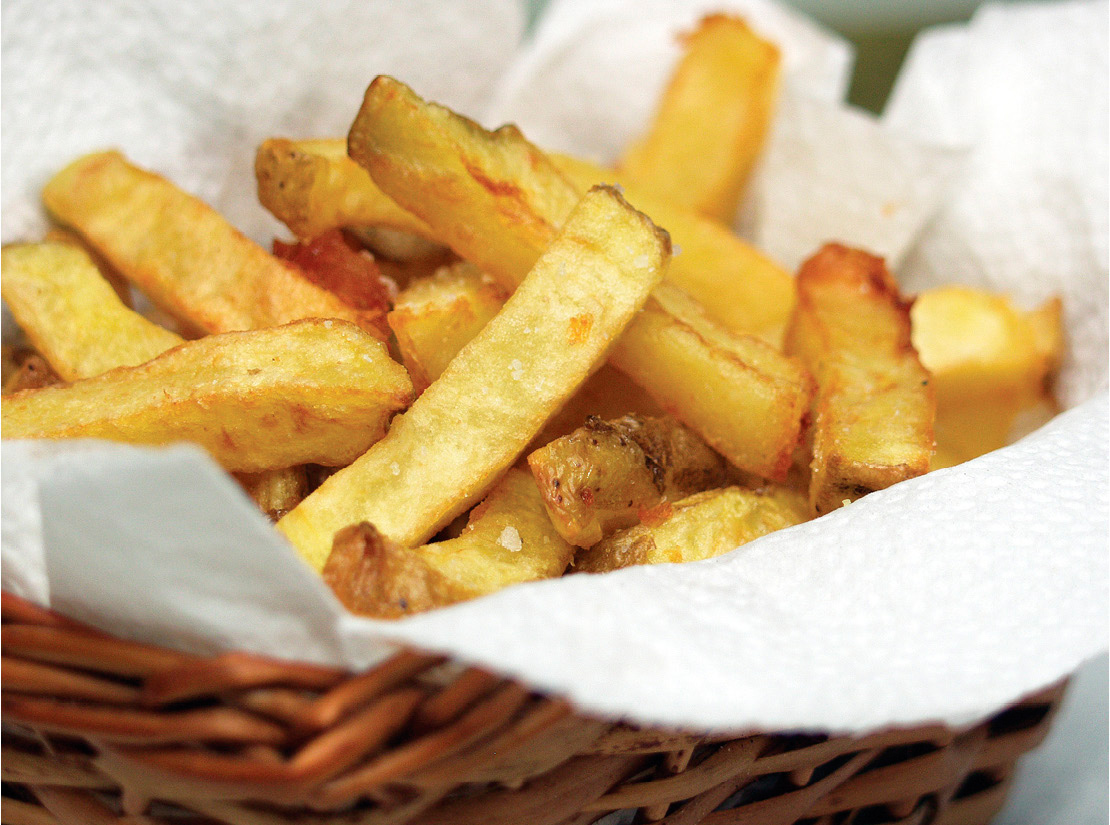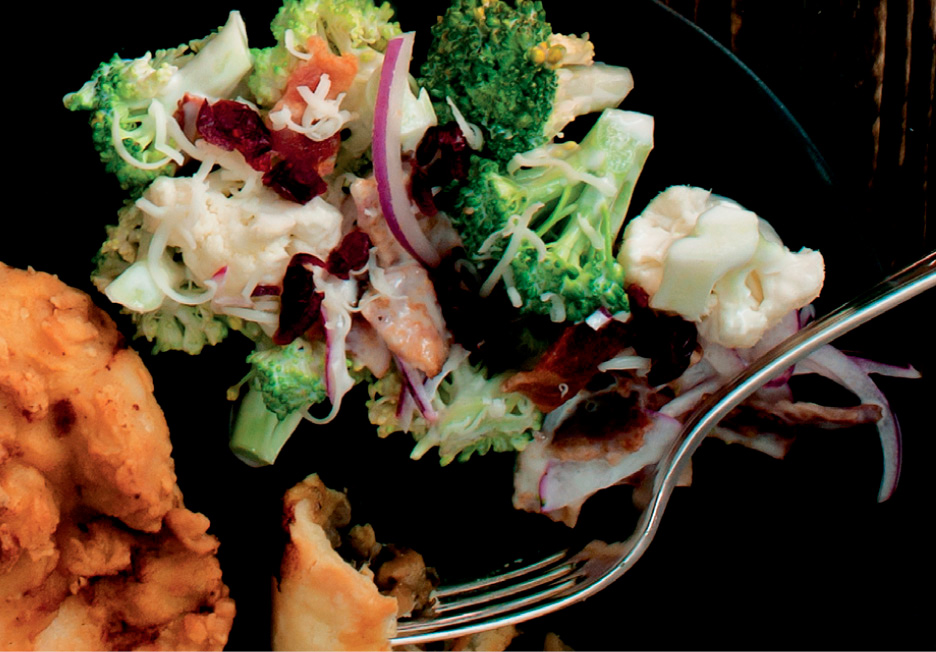


Side Dishes
She cut a dumpling in half and ate it slowly, savoring the rich warm juices of chicken and onion. She was grubby, travel-worn, starved, and exhausted, every bone in her body aching. They had made it, though, they were in Cross Creek, and tomorrow was Monday. Somewhere nearby was Jamie Fraser—and God willing, Claire as well.
She touched the leg of her breeches, and the secret pocket sewn into the seam. It was still there, the small round hardness of the talisman. Her mother was still alive. That was all that mattered.
—Drums of Autumn, chapter 41, “Journey’s End”
Drop these soft dough balls onto Vegetable Stew or Cock-a-Leekie for a Scottish version of chicken and dumplings—cold-weather comfort at its most scrumptious.
Makes 12

Ingredients
1 cup all-purpose flour
1 cup stone-ground whole wheat flour
¼ cup chopped fresh chives
2 tablespoons chopped fresh parsley
2 teaspoons baking powder
1 teaspoon kosher salt
¼ cup (4 tablespoons) cold butter
1 cup whole milk
In a medium bowl, mix together the flours, chives, parsley, baking powder, and salt. Grate in the butter and work it in with your hands until the mixture is well blended and the flour is the color of cornmeal.
Stir in the milk until combined into a loose, soft dough. With floured hands, form the dough into 12 balls (about the size of golf balls).
Place on top of a gently bubbling stew or soup, leaving space between. Cover and cook until the bottoms are no longer doughy, about 15 minutes.
Note
• For a vegan version, substitute cold coconut oil for the butter and an almond or rice beverage for the milk.
Auld Ian’s Buttered Leeks
“I remember, when they were young, auld John told Ian it was his job to stand to Jamie’s right, for he must guard his chief’s weaker side in a fight. And he did—they took it verra seriously, the two of them. And I suppose auld John was right, at that,” she added, snipping off the excess thread. “After a time, nobody would fight them, not even the MacNab lads. Jamie and Ian were both fair-sized, and bonny fighters, and when they stood shoulder to shoulder, there was no one could take the pair o’ them down, even if they were outnumbered.”
She laughed suddenly, and smoothed back a lock of hair behind her ear.
“Watch them sometime, when they’re walking the fields together. I dinna suppose they even realize they do it still, but they do. Jamie always moves to the left, so Ian can take up his place on the right, guardin’ the weak side.”
—Dragonfly in Amber, chapter 33, “Thy Brother’s Keeper”
Tender, mild leeks simmered gently in their own buttery juices—the perfect dish to guard the main’s weaker side. Don’t be surprised if this unassuming side, when fresh out of the pan and sitting beside a roast chicken or beef, emerges from the shadows to become a dinnertime star.
Serves 6
Ingredients
6 to 8 medium leeks, halved lengthwise (white and light-green parts only)
¼ cup (4 tablespoons) butter
1 teaspoon chopped fresh thyme
½ teaspoon kosher salt, plus additional
¼ teaspoon ground white pepper, plus additional
Method
Thinly slice the leeks on a diagonal and rinse them thoroughly in a bowl of cold water. Scoop out the leeks with a slotted spoon, leaving the silt and sand behind. Shake dry in a clean dishcloth or salad spinner.
In a large saucepan, melt the butter over medium heat. When bubbling, add the sliced leeks, thyme, salt, and pepper. Stir to coat well with butter. Cover, reduce the heat to low, and cook until tender, about 15 minutes, stirring once or twice. Taste and add more seasonings if required.
Serve hot, alongside Claire’s Roast Chicken or Roast Beef for a Wedding Feast.
Store leftovers in the fridge up to 3 days.
Notes
• If you have leftovers, chop them finely and mix into butter for the next night’s steak, stuff them into Trout Fried in Cornmeal before frying, or add them to a pot of homemade soup bubbling on the stove.
It was getting dark by the time he returned to his rooms. He could hear a clatter from the dining hall as he passed, and he smelled boiled ham and baked beans, but supper was the farthest thing from his mind.
He squelched up to his rooms and dropped his wet things in a heap on the floor. He dried himself, then sat naked on the bed, towel forgotten in his hand, staring at the desk and at the box that held Brianna’s letters.
He would do anything to save her from grief. He would do much more to save her from the stones.
—Drums of Autumn, chapter 22, “Spark of an Ancient Flame”
English baked beans are cooked on the stovetop in a tomato sauce that is less sweet than molasses-based beans from North America. They are a traditional part of a full English breakfast, and make a quick lunch or dinner when served on toast with melted cheese.
Serves 6
Ingredients
1 pound (450 grams) dry white beans, such as cannellini, great northern, or navy
3 tablespoons vegetable oil
1 large carrot, grated
2 garlic cloves, minced or grated
1 can (14 ounces or 398 ml) tomato sauce
¼ cup dark brown sugar, lightly packed
1 tablespoon Worcestershire sauce
½ teaspoon smoked or sweet paprika
2 tablespoons butter
Kosher salt to taste
Method
Soak the beans overnight in a large bowl of cold water.
Drain the beans and add them to a large saucepan. Cover with cold water and bring to a boil over high heat. Once the beans have reached a rolling boil, reduce the heat to a simmer. Skim off any foam that has collected on the surface of the water and cook until tender, topping up the water as needed, 45 to 60 minutes, depending on the variety and age of the beans.
Meanwhile, in a medium saucepan, heat the oil to shimmering over medium flame. Add the carrot and garlic and cook, stirring constantly, until very soft but with no color, about 10 minutes. If necessary, reduce the heat to prevent the vegetables from coloring.
Add the tomato sauce, brown sugar, Worcestershire sauce, paprika, and 1 cup water to the pan. Stir well, bring to a boil, reduce the heat, and simmer for 20 minutes. Puree until smooth with an immersion blender.
Drain the beans and add them to the sauce, stirring to combine. Simmer for another 20 minutes while the flavors combine, adding a little more water if the sauce is too thick. Stir in the butter and season with salt.
Serve hot with a Bacon, Asparagus, and Wild Mushroom Omelette for a savory and filling gluten-free breakfast.
Beans are always tastier the next day—keep leftovers in the fridge up to 5 days.
Notes
• While any small white bean will work, I prefer the cannellini for their smooth texture.
• Use a countertop blender to puree the sauce if you don’t have an immersion blender.

“Och, aye?” The woman squinted censoriously at the basket. “Well, what d’ye do wi’ them, then?”
“Well, you . . .” Jamie started, and then stopped. It occurred to me, as it no doubt had to him, that while he had eaten potatoes in France, he had never seen one prepared for eating. I hid a smile as he stared helplessly at the dirt-crusted potato in his hand. Ian also stared at it; apparently Sir Walter was mute on the subject of potato cooking.
“You roast them.” Fergus came to the rescue once more, bobbing up under Jamie’s arm. He smacked his lips at the sight of the potatoes. “Put them in the coals of the fire. You eat them with salt. Butter’s good, if you have it.”
“We have it,” said Jamie, with an air of relief. He thrust the potato at Mrs. Murray, as though anxious to be rid of it. “You roast them,” he informed her firmly.
—Dragonfly in Amber, chapter 32, “Field of Dreams”
If you are sitting around the campfire, by all means, wrap your tatties in aluminum foil and roast them in the coals. In lieu of an open fire, these oven-roasted spuds make a delightful side to Claire’s Roast Chicken, as well as Cock-a-Leekie.
Serves 6
Ingredients
3 pounds (1.4 kilograms) russet potatoes (about 6 medium), peeled and quartered
1 large onion, cut into 8 wedges
⅓ cup vegetable oil
3 fresh thyme sprigs
1 teaspoon kosher salt, plus additional
¼ teaspoon freshly ground pepper
Method
Move a rack to the middle rung and heat the oven to 425°F.
Rinse the potatoes and cover them with cold salted water in a large pot. Bring to a boil, uncovered, over high heat. Reduce to medium-high and boil gently for 5 minutes. Drain the potatoes in a colander and allow to steam dry for 2 minutes.
In a metal baking pan, toss the potatoes with the onions, oil, thyme, salt, and pepper. Roast for 30 minutes, then flip the potatoes and squash slightly with the back of your fork or spatula. Return the pan to the oven until the potatoes are golden, crispy, and tender, about 15 more minutes. Serve hot.
Note
• To cook these with Claire’s Roast Chicken, put them in the oven at the chicken’s 30-minute mark. (The higher oven temperature will be fine while the tatties share the space with the chicken.) Flip and squash the tatties at about the same time you take the chicken out of the oven, reduce the temperature to 425°F, and finish cooking the potatoes while the chicken rests and you make the gravy.

Seized by the sudden desire to see her, he reached out, fumbling on the table by the bed. The little box was where she’d thrown it when they came back. She’d designed it to be used in the dark, after all; a turn of the lid dispensed one of the small, waxy sticks, and the tiny strip of roughened metal glued to the side was cool to his hand. A skritch! that made his heart leap with its simple familiarity, and the tiny flame appeared with a whiff of sulfur—magic.
“Don’t waste them,” she said, but smiled in spite of the protest, delighted at the sight as she’d been when she first showed him what she’d done.
Her hair was loose and clean, just washed; shimmering over the pale round of her shoulder, clouds of it lying soft over his chest, cinnamon and amber and roan and gold, sparked by the flame.
—A Breath of Snow and Ashes, chapter 21, “We Have Ignition”
If these were for Roger, I’d call them chips. But since these crisp golden sticks are all about our Boston Bree, they’ve just got to be fries. Because they start in cold oil, the potatoes first poach in the warming oil before it gets hot enough to fry and crisp up the outsides. The most succulent, least-hassle homemade fries you’ll ever make.
Ingredients
1 large yellow potato
Vegetable oil
Kosher salt to taste
Method
Wash the potatoes and scrub off any dirt. Square off the sides and ends of the potatoes, then cut lengthwise into ⅜ x ⅜-inch sticks. Arrange the potatoes in a large saucepan (see Notes) and cover completely with the oil.
Cook over high heat, undisturbed, until the oil comes to a rolling boil, 8 to 12 minutes. Stir once with a slotted spoon, gently scraping the bottom of the pan to release any potatoes that stick. Continue to cook, stirring occasionally, until light golden and crisp, another 10 to 15 minutes.
Drain on paper towels, sprinkle with salt, and serve.
Notes
• The high moisture content of Yukon Gold potatoes is essential for best results. Russets work, but the finished fries are much darker.
• Choose a pan that is large enough to hold the fries and oil with lots of room to spare, to avoid a spillover once the oil starts to boil. I use a tall, narrow pot, which uses about 2½ cups oil to cover two large potatoes.
• Once the oil has cooled, strain and store it in the fridge in a tightly closed container. You can use each batch of oil four or five times. Discard it before it becomes dark and smelly.
• For additional servings, use one potato per person.

A hum of pleasant anticipation rose around me, as people began metaphorically to loosen their belts, squaring up to the tables with a firm determination to do their duty in honor of the occasion.
Jamie was still stuck fast to Mrs. MacDonald, I saw; he was helping her to a dish of what looked from the distance to be broccoli salad. He looked up and saw me, beckoned me to join them—but I shook my head, gesturing with my fan toward the buffet tables, where the guests were setting to in the businesslike manner of grasshoppers in a barley field. I didn’t want to lose the opportunity of inquiring about Manfred McGillivray, before the stupor of satiety settled over the crowd.
—A Breath of Snow and Ashes, chapter 54, “Flora MacDonald’s Barbecue”
Crunchy and sweet, this raw broccoli and cauliflower salad looks quite different from the eighteenth-century version that would have adorned Jocasta’s table, but it is an easy, make-ahead recipe that makes a delicious and colorful contribution to any modern-day potluck.
Serves 8 to 10
Ingredients
1 cup mayonnaise
¼ cup sugar
¼ cup white vinegar
3 large broccoli crowns (2 to 2½ pounds or 900 to 1,100 grams), cut into small florets (see Notes)
1 small cauliflower (1 to 1½ pounds), cut into small florets
1 pound (450 grams) bacon, cooked and crumbled (see Notes)
1 medium red onion, julienned (see Knife Skills)
4 ounces (115 grams or about 1 cup) shredded aged cheddar cheese
1 cup dried cranberries, chopped
Method
In a small bowl, stir together the mayonnaise, sugar, and vinegar until well combined.
In a large bowl, toss together the broccoli, cauliflower, bacon, onions, cheese, and cranberries. Pour over the dressing and toss well to coat evenly. Cover and refrigerate to allow the flavors to meld, 2 to 4 hours.
Store leftovers in the fridge up to 3 days.
Notes
• You want about double the amount of broccoli to cauliflower by volume.
• For a vegan version, use an eggless mayonnaise and substitute chopped pecans for the cheese.
• The easiest way to cook a lot of bacon is in the oven, at 375°F, on a wire rack set in a baking pan. Cook for 12 to 15 minutes, until the bacon is crisped and darkening in color.
Honey-Roasted Butternut Squash
Bird’s wife Penstemon’s nostrils flared delicately; Crombie was sweating with nervousness, and smelled like a goat. He bowed earnestly, and presented Bird with the good knife he had brought as a present, slowly reciting the complimentary speech he had committed to memory. Reasonably well, too, Jamie thought; he’d mispronounced only a couple of words.
“I come to b-bring you great joy,” he finished, stammering and sweating.
Bird looked at Crombie—small, stringy, and dripping wet—for a long, inscrutable moment, then back at Jamie.
“You’re a funny man, Bear-Killer,” he said with resignation.
“Let us eat!” It was autumn; the harvest was in and the hunting was good. And so the Feast of the Guns was a notable occasion, with wapiti and venison and wild pig raised steaming from pits and roasted over roaring fires, with overflowing platters of maize and roasted squash and dishes of beans spiced with onion and coriander, dishes of pottage, and dozen upon dozen of small fish rolled in cornmeal, fried in bear grease, their flesh crisp and sweet.
—A Breath of Snow and Ashes, chapter 67, “The Last Laugh”
A sweet vegetable side that brings color to any plate, including Veal Patties in Wine Sauce, or Buttermilk Lamb Chops with Rosewater Mint Sauce.
Serves 6
Ingredients
2 tablespoons olive oil
2 tablespoons honey
1 garlic clove, grated or minced
1 teaspoon kosher salt
½ teaspoon crushed red pepper flakes
1 medium (2 to 2½ pounds or 900 to 1,100 grams) butternut squash, peeled and cut into 2-inch cubes
Method
Move a rack to the middle rung and heat the oven to 400°F.
In a small bowl, whisk together the olive oil, honey, garlic, salt, crushed red pepper flakes, and 2 tablespoons hot water.
Place the squash cubes in a large glass or ceramic baking dish, pour the honey mixture over the squash, and stir to coat the pieces. Roast until tender and just starting to brown, 35 to 40 minutes, tossing the squash once during cooking.
Toss in the sticky, but still wet, glaze one last time and serve hot.
Store leftovers in the refrigerator up to 3 days.
Notes
• Any winter squash (acorn, Hubbard, pumpkin, et cetera) substitutes well. Adjust the cooking time as required.
• To make this vegan, substitute maple syrup for the honey.
• To give this side an Asian twist, add 1 teaspoon sesame oil to the honey mixture, and toss the hot cooked squash in 2 tablespoons toasted sesame seeds just before serving.